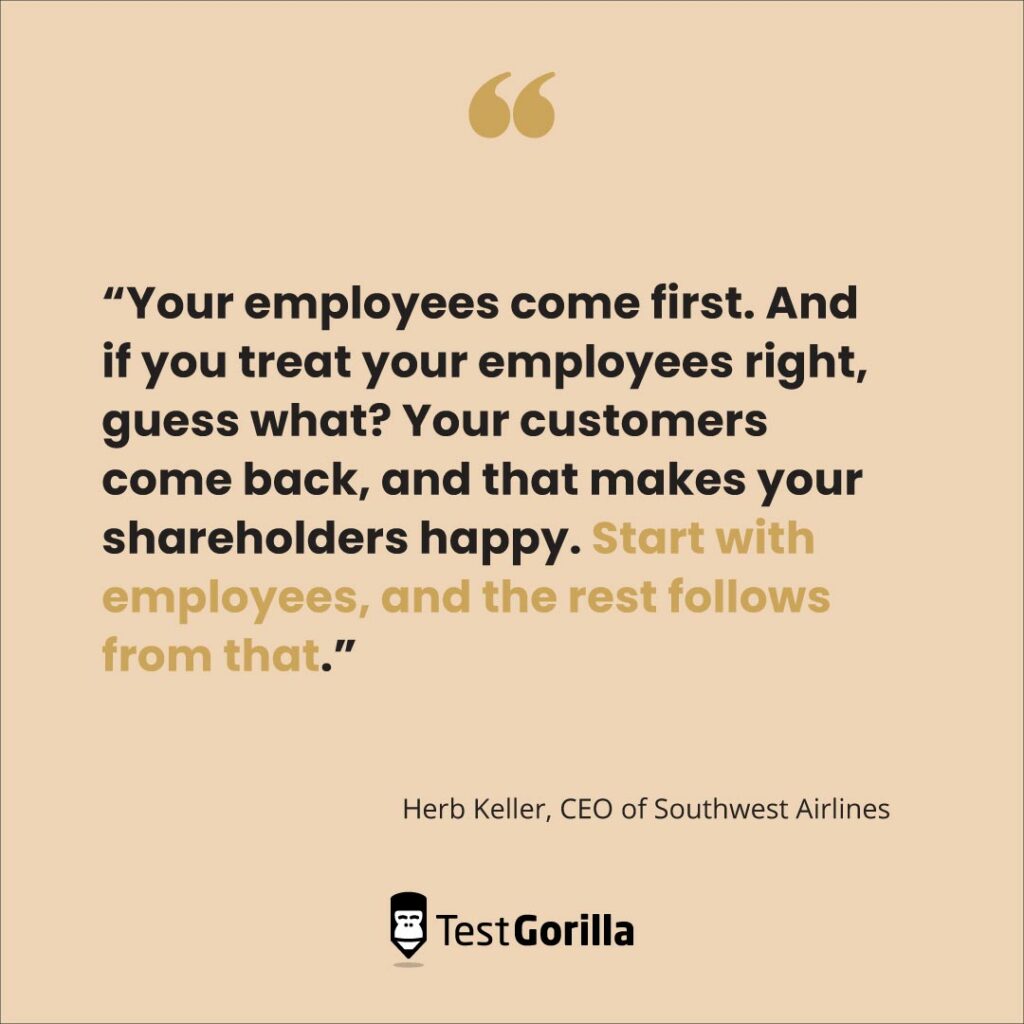Every organization needs meaning beyond the bottom line.
A corporate purpose explains why a company delivers a service or product and how its offerings impact the world.
Although this may sound like virtue signaling to some, the best organizations recognize that a defining purpose creates clarity in the direction they are headed and leads to positive business outcomes.
A strong corporate purpose helps companies attract talent that is aligned with their mission and retain workers by giving them reasons to stay that are greater than a paycheck.
It also enables organizations to create cohesive cultures and strengthen their brands for the future.
As a leader in skills-based pre-employment assessments, TestGorilla sees the positive impact corporate purpose plays during the hiring process for clients daily.
So let’s bring this concept to life by diving into how (and why) your company can reinforce its corporate purpose and explore some purpose-driven companies worth looking up to.
Table of contents
What is corporate purpose, and why is it important?
Corporate purpose refers to the fundamental reason why a company exists beyond simply making a profit. It encompasses the company’s values, goals, and mission while also reflecting what the organization seeks to achieve in the world through its business strategy.
Corporate purpose provides a clear direction for companies and guides decision-making while inspiring employees, customers, suppliers, and community members.
Another important aspect of corporate purpose is that the concept stands in contrast to the principle of shareholder value maximization.
In short, it means a company doesn’t solely focus on maximizing profit and economic value.
Instead, corporate purpose goes beyond the traditional focus of generating financial returns and includes considerations for the company’s impact on society and the environment.
In recent years there has been growing recognition that companies have a broader responsibility to stakeholders other than profits.
This is due to a variety of reasons, but in part can be attributed to:
How the Covid-19 pandemic emphasized social and economic inequities
A concurrent rise in the importance of DEI initiatives in the workplace
Increasing passion for the planet and care for a company’s environmental footprint
In reality, the best corporations have always recognized that purpose is inextricably linked to profits and how treating employees properly creates better outcomes for the business and the world.
As Herb Keller, the long-time CEO of Southwest Airlines, once said:
“Your employees come first. And if you treat your employees right, guess what? Your customers come back, and that makes your shareholders happy. Start with employees, and the rest follows from that.”
Let’s explore how prioritizing a greater purpose for others creates benefits for companies as a result.
The benefits of having a strong corporate purpose
One way to think about the benefits of a strong corporate purpose is to consider how various people within your organization rely on it to make better decisions.
For example, consider how different departments can leverage a corporate purpose that’s inspirational and relevant to your industry. When united under a single, coherent purpose:
Human Resources can demonstrate values to employees and help managers hire and develop talent aligned with your brand
Sales and Marketing can more effectively sell products and speak authentically to consumers
Finance and Accounting can make better financial trade-offs based on what is right for the company mission
Operations can optimize how they interact with external vendors and coordinate information within the organization
Research and Development can gain a better sense of what product enhancements are more important than others
Investor Relations or Legal can better express how and why your company is committed to environmental, social, and governance (ESG) policies
Leadership can pinpoint how they want to transform the company for the future
When your entire organization moves in the same direction thanks to a strong corporate purpose, your business can see tangible benefits in unlikely places.
Unfortunately, we don’t have the time to explore every benefit that a strong corporate purpose can bring to your organization (there are far too many to capture in one article). However, we can explore some of our favorites that might surprise you.
Benefits of a strong corporate purpose | How this expresses itself |
Attract and retain top talent | Studies show that employees who find purpose in their day-to-day work report much greater levels of energy, commitment, and excitement. Employees are also to work at a company that cares about how it impacts the world. |
Improve employee satisfaction and engagement | A recent Bain report found that of the employees who reported improved satisfaction levels throughout the pandemic, 86% said their employer had a meaningful purpose that they were passionate about. |
Boost financial performance and company growth rates | As a real-world example, Accenture found that Unilever’s purpose-driven brands grew 50% faster than peers and accounted for more than 60% of the company’s growth. So although a corporate purpose extends beyond corporate profits, it also doesn’t hurt the bottom line either! |
Improve customer loyalty | Purpose helps create meaningful connections with consumers and drive greater customer loyalty. For example, one study showed that 79% of customers feel a better connection with companies that share their values. An additional 72% believe that purpose-driven companies care more about them and their loved ones. |
Taken together, a strong corporate purpose leads to beneficial outcomes for your bottom line, the surrounding community, and especially the workers involved in your organization.
9 ways to build a purpose-driven organization
Given the benefits a strong corporate purpose provides to businesses and their people, you might think every company is doing it right, or at least trying to.
Unfortunately, that’s not the case. Many corporations continue to fall short of creating and leading with an inspiring purpose, while many others don’t consider their corporate purpose a valuable enough point to focus on.
If you want to know where your company stands in this regard, simply ask your employees.
If you’re like the average company, as a recent McKinsey study revealed, 82% of your employees think your corporate purpose is important, but only 42% believe it drives your business decisions.
So how do you build a purpose-driven corporation? Is it about better employee benefits, more leadership offsites, or the retelling of an inspirational founding story?
The answer is more foundational – purpose-driven organizations let their mission steer every aspect of their business, from hiring practices to expansion decisions.
Let’s look at some of the best ways your company can start implementing purpose into how and why it operates.
Tips for building a purpose-driven company: A summary table
Ideas to create a purpose-driven organization | What this means, in a nutshell |
Create a powerful mission statement (and wear it on your sleeve) | Represent your corporate purpose with a simple goal that everyone can understand |
Embrace sustainability as a core value | Include environmental considerations in your purpose |
Live and breathe your corporate purpose | Use your purpose to effect change |
Adopt to reduce bias and prioritize alignment with your purpose | Consider how candidates align with your corporate purpose during the hiring process |
Hire with in mind to nurture your purpose with each new hire | Hire talent that also has the soft-skills to thrive and add to a healthy culture |
Encourage and to strengthen your purpose | Invest to improve diversity, equity, and inclusion at your company |
Ensure your leaders stand behind the corporate purpose | Make sure your board of directors, managers, and other business leaders provide a good example |
Recognize and reward employees for embodying the corporate purpose | Encourage the right behaviors from employees through recognition and awards |
Connect your purpose to partners and stakeholders outside your organization | Carry out your corporate purpose by impacting partners and community members |
Keep reading to learn how to carry out each of our suggestions with ease.
1. Create a powerful mission statement
A powerful mission statement crystallizes your corporate purpose into a declaration that answers three main questions:
Who do you plan to help?
How do you plan to help them?
Why do you care about helping?
Take a variation of our mission statement at TestGorilla, for example:
We are on a mission to help employers hire the best talent possible without hassle or bias through pre-employment skills assessments to create a world where everyone has their dream job.
A mission statement like this makes it clear to our employees how their efforts contribute to a better world and helps us convey our value proposition to outsiders.
You obviously want to make sure that your statement of purpose fits the overarching goal of your organization and feels relevant to your people and stakeholders. That way, your company’s policies and practices accurately reflect your values.
If you’re struggling to find your company’s purpose, consider looking for the overlapping area that satisfies four distinct audiences:
What the world needs
What your company is uniquely good at
How your company can create value
What people at the company are passionate about
This framework makes it easy to create a mission statement that aligns with your company’s financial and strategic goals.
2. Embrace sustainability as a core value
Environmental considerations are an increasingly important part of the most admired businesses.
This is especially important for business models that have impacts on the environment through their own actions or the practices required to manufacture, ship, and deliver their products.
Implementing sustainability as part of your company’s purpose has benefits for the globe and is deeply connected to the concept of corporate social responsibility.
However, it also serves as one of the many great incentives businesses can leverage to promote talent acquisition. That’s because more than 70% of employees and job candidates believe sustainability programs make employers more attractive.
Therefore, sustainability should be a core value for all businesses, regardless of their direct impact on the environment.
Organizations can start by leveraging ESG principles to promote ecological well-being. This strategy can involve monitoring the company’s carbon footprint, recycling manufacturing materials, and more.
3. Live and breathe your corporate purpose
There’s no point in having a corporate purpose that sits on your website or hangs as a motivational poster on the wall if it doesn’t enact change.
Make sure corporate purpose is more than just a buzzword by demonstrating your corporate values through actions you take with stakeholders both inside and outside your company.
This might mean changing your hiring practices to reduce toxic culture and foster empathy. It might also mean changing the types of advertisers and other third-party partners your company works with.
Regardless of how you carry these changes out, try to measure and track the impact of your purpose through goals and key performance indicators that help your organization understand whether it’s achieving its purpose.
4. Adopt skills-based hiring practices to reduce bias and increase alignment
Skills-based hiring practices that emphasize objective assessments of candidates’ capabilities over how they present their past experiences enable companies to place workers in the role they are best suited for.
When you hire candidates in this way, you find employees that are more aligned with your company’s mission and ready to perform from day one.
This creates happier employees that are more likely to stick around to help you execute your corporate purpose.
5. Hire with culture in mind to nurture your purpose
Corporate culture can significantly add to or detract from your company’s purpose, so it’s important to hire employees that contribute positively to a common goal.
Although many employers find it hard to test for culture reliably, TestGorilla’s objective pre-employment assessments can help take the noise out of this nebulous concept for businesses across industries.
Employers who care about how their personnel impact culture can check out our personality test or our Culture add test to find employees that align with their organizational purpose.
6. Encourage and prioritize diversity to strengthen your purpose
Diversity and inclusion are closely related to corporate purpose and may even be an explicit part of your company’s mission. A strong corporate purpose also helps support a normally diverse set of customers through innovative products or services.
Or, at least, that should be a primary goal of your purpose.
Executing said goal requires a diversity of thought, background, and approach within your organization.
By valuing diversity, a company can deliver on the needs of its customers and create an effective organization that is viewed positively by inside and outside stakeholders alike.
7. Ensure your leaders stand behind the corporate purpose
The tone set by leaders at your company determines whether other employees conduct themselves in a way that supports your corporate purpose.
Employees who see executives leading from the top are likely to follow suit and act in accordance with your company’s mission.[1]
Two-way feedback and continuous learning and development for executives are two simple ways to encourage leaders to stand behind the corporate purpose.
Remember, employees at all levels should recognize and adhere to your specific purpose. But fortifying it from the top is one of the best ways to help it permeate throughout your organization.
8. Recognize and reward employees for embodying your purpose
Behaviors and achievements that further your corporate mission should be recognized and appreciated.
Plus, recognition has the added benefit of creating engaged employees that are more likely to feel connected to their work and perform better.
Although there are many strategies to recognize good employee performance, you might consider:
Using spot awards for immediate feedback
Encouraging peer-to-peer recognition as a powerful motivational mechanism
Incorporating non-traditional employee benefits to show your appreciation
All of these methods can help reinforce when employees are embodying your corporate purpose and encourage others to do the same.
9. Connect your purpose to partners and stakeholders outside the organization
To be effective, a corporate purpose needs to impact stakeholders outside your organization, such as customers, community members, or suppliers.
One way to do this is to sit back and let your work and sales make these changes for you.
But a better way is to intentionally advance your business by connecting with like-minded partners.
For example, your company may decide to:
Collaborate with other companies who share your mission
Donate to nonprofits that are relevant to your purpose
Engage with government entities that support shared goals
Not only does this improve the chances of carrying out your corporate purpose, but it also provides beneficial publicity of the positive impact your company is making.
5 examples of purpose-driven companies
Now that we’ve covered the benefits of having a corporate purpose and the actions your company can take to build a stronger purpose, maybe you’re wondering… Who’s doing this well?
To answer this question, we’ve compiled a handful of companies putting purpose at the heart of their organization.
Although certainly not an exhaustive list, it’s interesting to note the wide variety of industries included, which demonstrates why corporate purpose is essential across a range of fields.
Here are 5 companies wearing their purpose on their sleeves:
Purpose-driven organizations | How they demonstrate their purpose |
Patagonia ’s purpose is to “build the best product, cause no unnecessary harm, and use business to inspire and implement solutions to the environmental crisis.” | This purpose is reflected in the company’s advocacy work on climate change and financial support to environmental causes. It also impacts their choice to use sustainable materials and offer repair services to increase reused and recycled products. |
TestGorilla ‘s purpose is to put 1 billion people in their dream jobs by revolutionizing the hiring process, promoting equality, and encouraging skills-based hiring. | This purpose drives nearly every decision at our company, from our investment in leading HR content to the way we designed our scientifically-backed testing platform for employers. It also impacts how we organize our workforce, empowering flexible and remote work policies that prioritize the best talent regardless of where they’re located. |
Ben & Jerry’s purpose is to “make the best possible ice cream, in the nicest possible way.” | This purpose is reflected in the company’s progressive values and support for social and political issues such as racial injustice and LGBTQ+ rights. It also drives their ethical sourcing of ingredients from suppliers that meet high standards for environmental and social responsibility. |
Airbnb ‘s purpose is to “create a world where anyone can belong anywhere” by enabling travelers to book unique and affordable accommodations around the world to facilitate cultural exchange and understanding. | This purpose is reflected in the company’s strong anti-discrimination policies designed to protect guests from being discriminated against based on their race, gender, sexual orientation, or other personal characteristics. The company has also launched social impact initiatives to further its mission by providing free accommodation to people in need and supporting sustainable tourism in underserved communities. |
REI ‘s corporate purpose is to “inspire, educate, and outfit for a lifetime of outdoor adventure and stewardship.” | This purpose is reflected in REI’s sourcing practices which only use suppliers who have sustainable and ethical manufacturing processes. It also influences the company’s community engagements, like supporting local outdoor initiatives and encouraging employees to volunteer time for environmental causes. |
One can see that all of these companies are living out their corporate purpose by enacting change or instituting practices directly related to their mission.
Although your organization’s purpose may be unique, you should think through what environmental, social, or sourcing actions your company can take to advance your cause.
Supercharge your hiring strategy with a strong corporate purpose
A strong sense of shared purpose drives employee satisfaction, facilitates business transformation, and helps boost customer loyalty.
A well-defined statement of purpose also helps your company stand apart from competitors in the minds of consumers and compassionate community members who share your cause, making it part of an optimal corporate strategy.
But above all, a strong corporate purpose is a magnet for top talent who care about working for a company for reasons that extend beyond a paycheck.
So the next time you’re looking for an impressive software engineer or an outstanding email marketing manager, attract them with a compelling purpose and assess them with TestGorilla’s wide library of pre-employment skills tests.
You’re bound to find a team player that cares about far more than a boring 9-to-5 job.
Source
“What It Really Means To Lead From The Top As A CEO”. (August 2, 2018). Corporate Staffing Services. Retrieved March 31, 2023. https://www.corporatestaffing.co.ke/2018/08/what-it-really-means-to-lead-from-the-top-as-a-ceo/
Related posts
Hire the best candidates with TestGorilla
Create pre-employment assessments in minutes to screen candidates, save time, and hire the best talent.
Latest posts
The best advice in pre-employment testing, in your inbox.
No spam. Unsubscribe at any time.

Hire the best. No bias. No stress.
Our screening tests identify the best candidates and make your hiring decisions faster, easier, and bias-free.
Free resources
This checklist covers key features you should look for when choosing a skills testing platform
This resource will help you develop an onboarding checklist for new hires.
How to assess your candidates' attention to detail.
Learn how to get human resources certified through HRCI or SHRM.
Learn how you can improve the level of talent at your company.
Learn how CapitalT reduced hiring bias with online skills assessments.
Learn how to make the resume process more efficient and more effective.
Improve your hiring strategy with these 7 critical recruitment metrics.
Learn how Sukhi decreased time spent reviewing resumes by 83%!
Hire more efficiently with these hacks that 99% of recruiters aren't using.
Make a business case for diversity and inclusion initiatives with this data.























